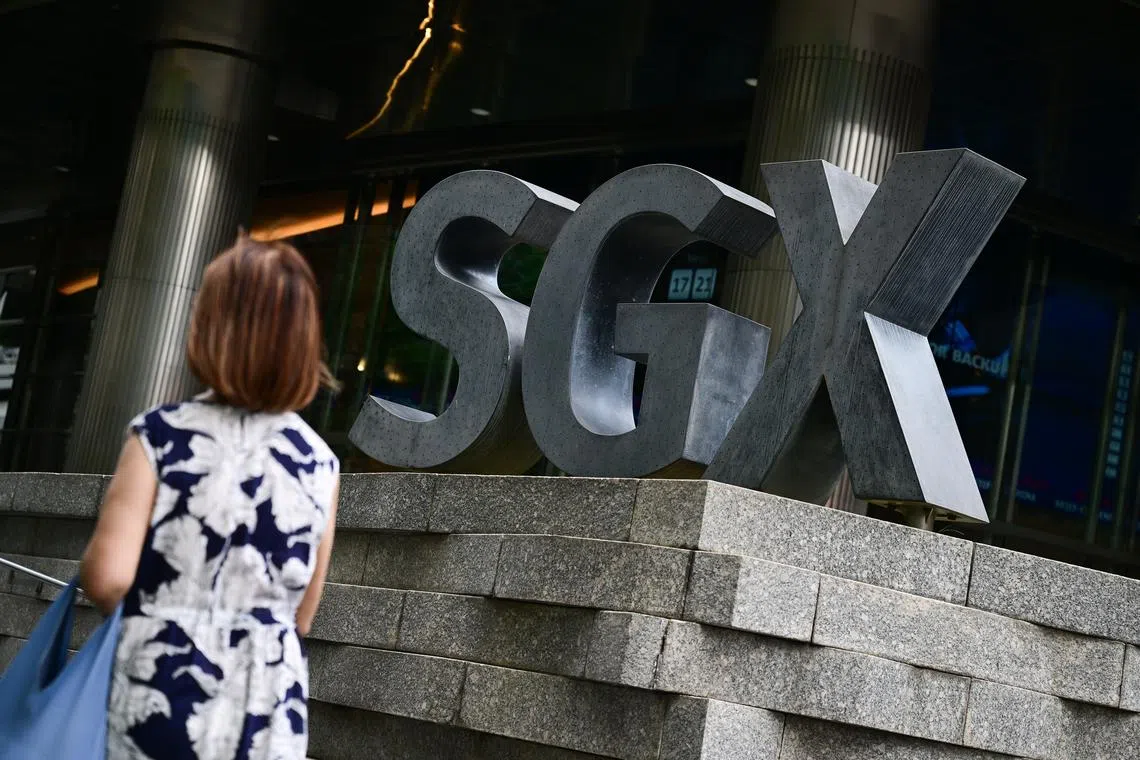Why are retail investors shunning Singapore stocks? Have your say in Sias survey
Sign up now: Get ST's newsletters delivered to your inbox

Sias and financial insights platform Beansprout on Nov 21 released a survey targeting retail investors.
PHOTO: ST FILE
SINGAPORE - Work is under way to identify the needs and challenges retail investors face when investing in the local stock market, as part of a broader effort to revitalise trading on the Singapore Exchange (SGX).
The Securities Investors Association (Singapore), or Sias, and financial insights platform Beansprout on Nov 21 released a survey targeting retail investors.
The survey questions delve into why respondents are not investing in Singapore stocks and what would encourage them to do so.
The survey was sent to Sias’ and Beansprout’s subscriber base and is available to the public on Beansprout’s website
It aims to engage as many retail investors as possible and encourage them to share their experiences and preferences when investing in the local stock market, Beansprout chief executive Gerald Wong told The Straits Times.
He noted that while interest in the local market does exist, this is mostly from investors looking for dividend stocks. This group of investors tends to buy high-yielding stocks and hold them for the long term, so trading is minimal.
“The question is how to broaden this pool beyond dividend investors to include a more diverse investor base,” he said.
“Through the survey, we can find out where the gaps in investor confidence lie, and whether we can help by contributing more content.
“The more input we get, the more it informs what we can do to help retail investors gain more confidence when investing in the stock market.”
Insights from the survey will also contribute to work being done by a review committee set up by the Monetary Authority of Singapore (MAS) in August
Led by Second Finance Minister and MAS deputy chairman Chee Hong Tat, the 31-member review committee has been tasked with recommending a set of measures to encourage listings, increase investor participation and streamline the regulatory framework, among others.
It must complete a report within 12 months, or by August 2025.
Sias president David Gerald, who is also a member of the committee, said the survey is an opportunity to hear directly from retail investors about their needs and the challenges they face.
He added that investor knowledge is important in driving greater interest in the Singapore equities market, and can be achieved through channels such as research reports, investor fact sheets, or corporate access.
“Many are not investing in local stocks, so we need to know why,” said Mr Gerald.
“If the survey findings confirm that access to investment research is a key area of concern, we will take the necessary steps to advocate for greater availability of independent equity research to support investors in making informed decisions,” he said.
While the number of equity research reports on Singapore stocks has fallen over the past six years due to global regulations on investor protection and low liquidity and trading volumes in the local market, some research houses and investment banks still provide them.
They include brokerages like Phillip Securities, the local banks, foreign investment banks such as Morgan Stanley, Nomura and Maybank Securities, as well as corporate services companies like Morningstar and independent platforms like Beansprout and Dr Wealth.
Still, most of the available research focuses only on blue-chip stocks and selected companies with large market capitalisations.
But Mr Matthias Chan, who heads equities research at SAC Capital, said investors will consume research on companies regardless of their market capitalisation, as long as there are fundamentally strong reasons for them to invest.
SAC Capital provides independent research on local stocks, with a focus on small and mid-cap companies. Some recent examples include Soilbuild Construction and CNMC Goldmine.
Said Mr Chan: “On Soilbuild Construction, we felt that the addition of new CEO Lim Han Ren and the company’s focus on digitalisation will give it an edge. After we initiated coverage in April, the stock hit an all-time high in mid-June with heavy volume.
“We also felt the geopolitical situation would benefit CNMC’s gold business, and initiated coverage in September. Following our report, the stock hit a three-year high.”
CNMC’s share price has since pared gains, but is still up 27.5 per cent since the start of 2024.
To support listings and expand the equity research ecosystem in the local public equity market, MAS provides grants under which eligible applicants receive funding on a per-report basis, among others.
Its research development grant scheme counts 12 research firms, with another two in the process of being included.
They comprise securities houses, investment banks, robo-advisers and digital investment platforms, an MAS spokesperson said.
Since it was first rolled out in 2019, the scheme has supported more than 1,100 research reports covering over 170 SGX-listed companies, or almost a third of the companies listed here.
Without the scheme, close to 100 firms would have had no research coverage at all.
Still, improving investor education by giving them more access to equity research is just one way to boost interest and responsible investments in local stocks.
To revitalise the stock market, the review committee will need to work on improving liquidity and attracting good quality listings at reasonable valuations that go on to perform well on the Singapore bourse.
There have been just four new listings on the SGX so far in 2024, compared with 16 delistings.
The regulatory framework could also do with more scrutiny.
While Singapore Exchange Regulation, or SGX RegCo, has said that it will look into how and when it queries listed companies on disclosure-related matters and unusual trading activities, market participants have said that clearer guidelines and more consistency on this front are needed.


